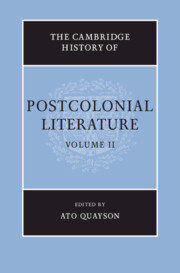Book contents
- Frontmatter
- 21 The language question in India and Africa
- 22 English and the development of postcolonial literature
- 23 Religion and postcolonial writing
- 24 Postcolonial responses to the Western canon
- 25 Island writing, Creole cultures
- 26 Magical realism
- 27 Palimpsest and hybridity in postcolonial writing
- 28 The narrative forms of postcolonial fiction
- 29 Poetry and postcolonialism
- 30 Primitivism and postcolonial literature
- 31 Popular culture and postcolonial literary production in Africa and India
- 32 Film and postcolonial writing
- 33 Fanon, Memmi, Glissant and postcolonial writing
- 34 Negritude and postcolonial literature
- 35 Publishing, prizes and postcolonial literary production
- 36 Key journals and organizations
- Bibliography
- Index
- References
27 - Palimpsest and hybridity in postcolonial writing
Published online by Cambridge University Press: 28 January 2012
- Frontmatter
- 21 The language question in India and Africa
- 22 English and the development of postcolonial literature
- 23 Religion and postcolonial writing
- 24 Postcolonial responses to the Western canon
- 25 Island writing, Creole cultures
- 26 Magical realism
- 27 Palimpsest and hybridity in postcolonial writing
- 28 The narrative forms of postcolonial fiction
- 29 Poetry and postcolonialism
- 30 Primitivism and postcolonial literature
- 31 Popular culture and postcolonial literary production in Africa and India
- 32 Film and postcolonial writing
- 33 Fanon, Memmi, Glissant and postcolonial writing
- 34 Negritude and postcolonial literature
- 35 Publishing, prizes and postcolonial literary production
- 36 Key journals and organizations
- Bibliography
- Index
- References
Summary
We leave the prints of our body, the touch of flesh on metal and stone. We constantly wear things out, with our hands, our feet, our backs, our lips. And we leave the traces of singular actions: the unintentional. The random, the intimate, unplanned touch on history’s passing: we break twigs, move pebbles, crush ants … all the signs that trackers learn to read. We leave footprints, as Neil Armstrong did on the Moon.
Introduction: ex-cavate [to uncover or lay bare by digging; to unearth]
Like most discussions involving the palimpsest this, too, begins with the concept’s common dictionary definition, ‘a parchment or other writing surface on which the original text has been effaced or partially erased, and then overwritten by another’. Palimpsesting originally referred to the technique used by ancient artisans to reuse scarce material for their inscriptions of new ideas and ideals of new, emerging worlds. In the word’s extended meaning, a palimpsest is more generally described as ‘a thing likened to such a writing surface, esp. in having been reused or altered while still retaining traces of its earlier form; a multilayered record’. The term has thus become a powerful metaphor for what Freud described as the ‘receptive surface … legible in suitable lights’, any surface, really, onto which New superimposes itself on Old. Samuel Coleridge is generally credited with introducing the palimpsest as a literary metaphor, but it was Thomas de Quincey who wove it into a treatise on human memory: ‘What else than a natural and mighty palimpsest is the human brain?’ – anticipating, of course, the idea of the receptive surface. In a slightly different vein Rudolph Byrd evokes Stuart Hall’s notion of metaphors of transformation, suggesting that the palimpsest may indeed function as a master metaphor in this respect, challenging us to ‘think expansively beyond the boundaries of what is known about the relations between the social and the symbolic‘.
- Type
- Chapter
- Information
- The Cambridge History of Postcolonial Literature , pp. 869 - 902Publisher: Cambridge University PressPrint publication year: 2012
References
- 5
- Cited by



